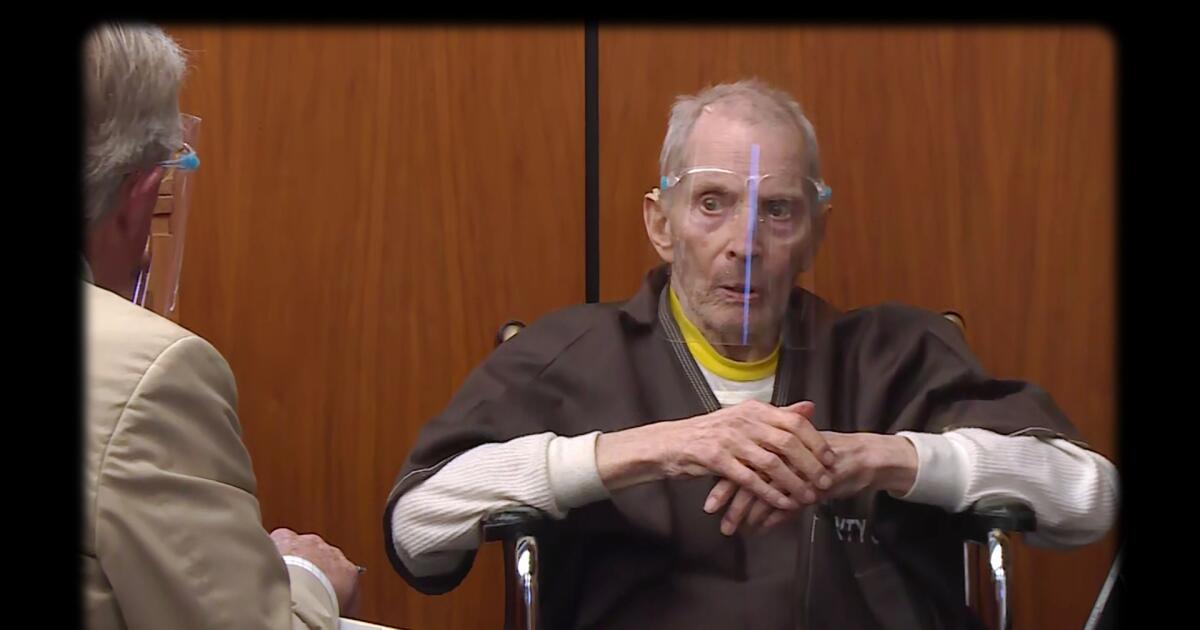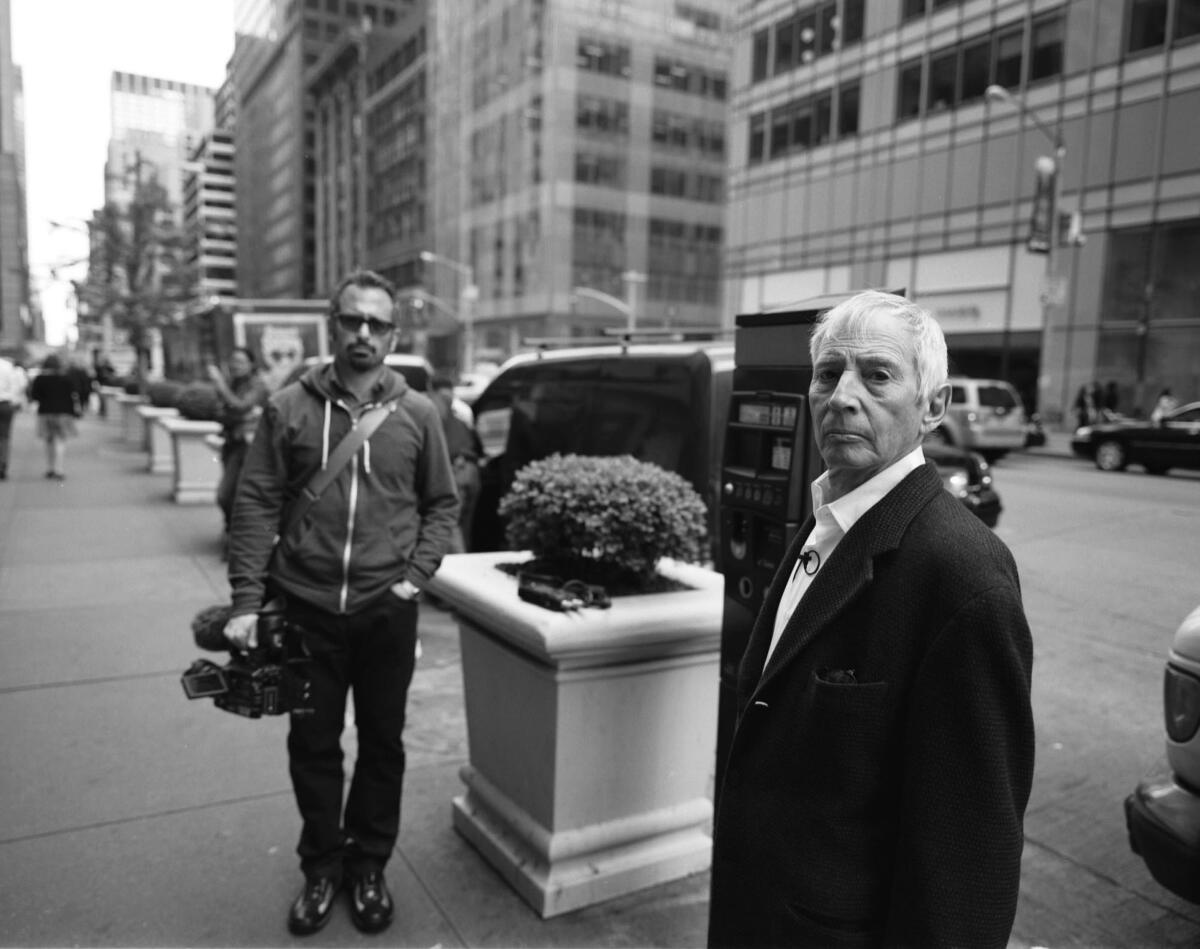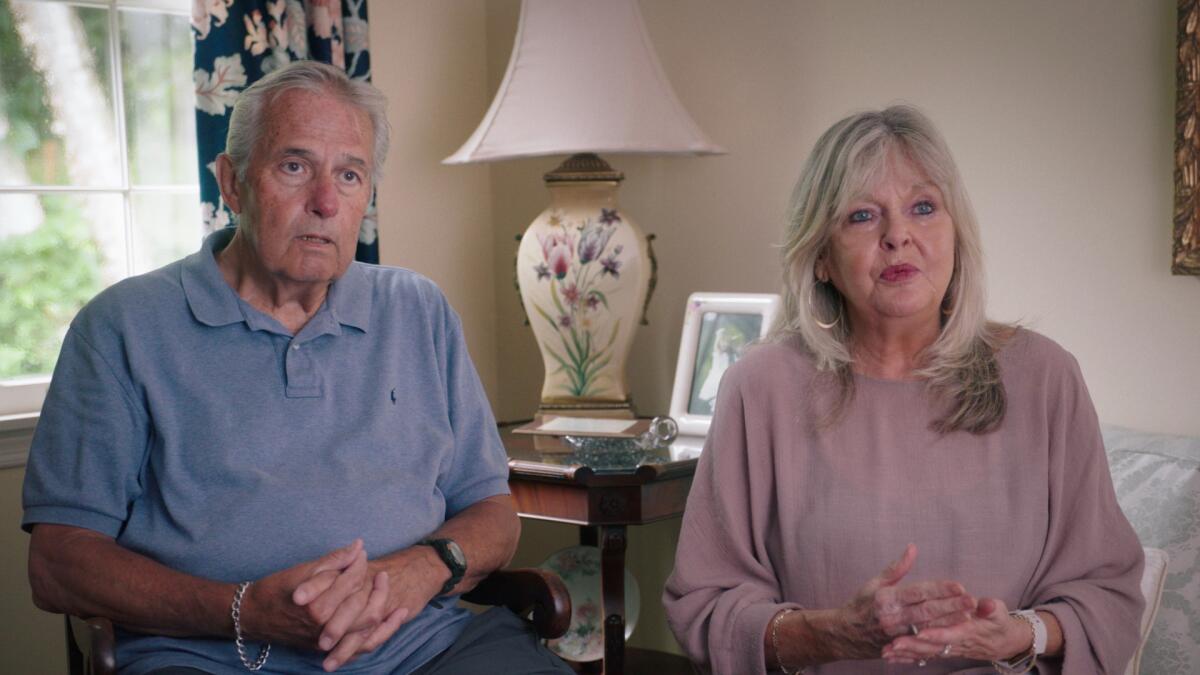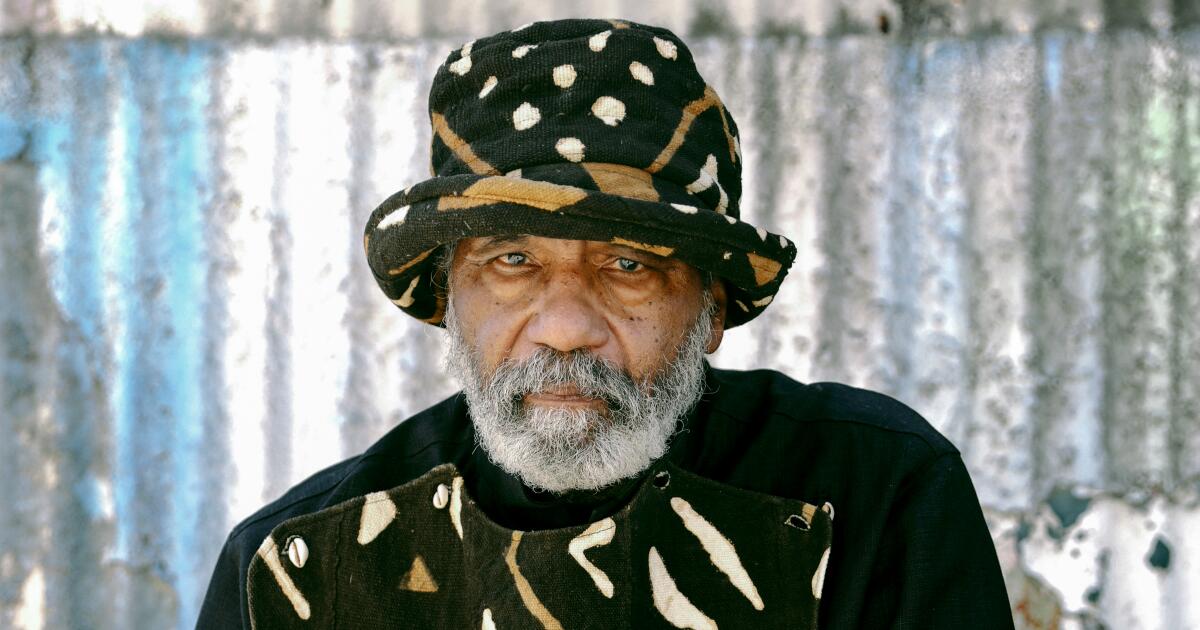Entertainment
In 'The Jinx — Part Two' finale, Andrew Jarecki says Robert Durst was enabled by wife and siblings

Filmmaker Andrew Jarecki has spent much of the last 20 years thinking about Robert Durst, the notorious real estate heir who was suspected in multiple murders but managed to evade justice until the very end of his life.
Jarecki’s Emmy-winning 2015 docuseries, “The Jinx: The Life and Deaths of Robert Durst,” thrust Durst into the spotlight by revisiting the mysterious deaths to which he was linked: the 1982 disappearance of Durst’s first wife, Kathie McCormack Durst; the murder of his best friend, Los Angeles writer Susan Berman, in 2000; and the grisly killing and dismemberment of his elderly neighbor, Morris Black, in 2001. And it famously led to Durst’s arrest in New Orleans the day before the broadcast of the explosive yet controversial finale in which he muttered, “killed them all, of course” to himself while in the bathroom.
In “The Jinx — Part Two,” a six-episode follow-up that concluded Sunday on HBO and is available to stream on Max, Jarecki looks at the dramatic events that have unfolded since Durst’s quasi-confession aired on national television and triggered a craze for high-end true-crime documentaries. This time around, the focus is less on Durst and his damaged psychology and more on the circle of friends and confidantes who helped him along the way.
“When we were making the first ‘Jinx,’ we would say, ‘How do you kill three people over 30 years and get away with it? It takes a village,’” said Jarecki, in a windowless editing suite in Chelsea, where he was joined by executive producer Zac Stuart-Pontier, who after 15 years in “The Jinx” world has a nearly instant recall of all things Durst-related. The conversation, which was scheduled for a half-hour, instead stretched to 90 minutes, an indication that the documentarians are nowhere near finished talking about Durst, who died in 2022 — or the friends and family who enabled him for years.
“This idea of complicity was for us so fascinating because it broadens the story,” Jarecki said. “Who are these people who see themselves as good, honest, decent people and don’t see themselves as accomplices in anything?”
Sunday’s finale, fittingly titled “It Takes a Village,” takes a critical look at the people who understood Durst — and what he was capable of — better than anyone: his siblings, Wendy, Douglas and Thomas; and his second wife and heir, Debrah Lee Charatan, who did not sit for an interview but is present in the series through video depositions and often riveting prison phone calls with her husband. The series portrays her as a shrewd opportunist, more consigliere than spouse, who helped Durst safeguard his fortune through numerous legal battles, used his wealth to amass a real estate empire of her own, and is now fighting a wrongful-death lawsuit from Kathie’s family, the McCormacks.
Robert Durst and his friend Susan Berman, who was killed in 2000.
(HBO)
“This is a person who’s really played the long game,” said Jarecki, whose 2010 feature film “All Good Things” was inspired by Durst — and led to his participation in “The Jinx.”
The finale recounts the history of Charatan’s relationship with Durst, which began in the late 1980s, when she was newly divorced and freshly bankrupt, and he was a wealthy eccentric rumored to have killed his first wife. The couple married in a secret ceremony in 2000, shortly after authorities in Westchester County, N.Y., reopened the investigation into Kathie’s disappearance — and days before Berman was shot in the head.
The series concludes with a dramatization of a woman resembling Charatan driving a luxury convertible down a scenic road and arriving at a palatial waterfront estate. It is intercut with deposition footage of the real Charatan, who is interrogated about sticking by Durst as he was accused of horrific things. “Was it worth it?” asks an attorney for the McCormack family. “I think so,” she says.
“I think she thought, ‘Well, I’m gonna make a calculation, that there’s so much value in staying connected to this person [Durst], because he’s going to die with 100-plus million dollars,’” Jarecki said. “By the way, it was hard, what she did — managing Bob for all those years. That was not easy. He’s an incredibly time-consuming, infuriating partner.” (Exhibit A: In one tense video call shown in the series, Durst clashes with Charatan over payment of his legal fees, threatening to write her out of his will. She skillfully walks him back.)
Charatan’s relationship with Durst came under more scrutiny following his death in January 2022. Because of a legal technicality in California, his conviction for Berman’s murder was abated — essentially vacated. This triggered the McCormack family to file a $100-million wrongful-death lawsuit against Durst’s estate, which is controlled by Charatan.

Director Andrew Jarecki, left, and Robert Durst.
(HBO)
Charatan sat for a deposition in the case. In portions that appear in “The Jinx,” she admits to living with another man throughout her marriage to Durst and says that she “respects” the jury’s guilty verdict in the Berman case. However, she says she does not believe that Durst killed Kathie.
“She has had so many chances to redeem herself, including potentially being in the show,” Jarecki said. “She could have explained why she was with him. She could have explained what she really believed.” The filmmaker said he tried to get Charatan to participate in the documentary, even going to dinner with her multiple times to plead his case, but was not successful.
“It Takes a Village” also considers the role played by Durst’s estranged younger siblings, who in deposition testimony say that they feared their older brother and even suspected he may have had something to do with Kathie’s disappearance but did little to assist the investigation at the time. They also reportedly never reached out to the McCormack family to offer support or condolences.
In audio testimony, Thomas Durst says that his siblings Wendy and Douglas never mentioned Kathie again after the disappearance: “It was like she had become a non-person and I decided, ‘You know what? Kathie is not just missing. Kathie’s dead, and Bob is responsible — but I don’t know what I can do.’”
Kathie’s body was never found, and in 2017 she was declared legally dead. Durst was formally charged with her death in 2021, but he died before a trial got underway.
“What would it have cost for them to reach out to Kathie’s family and say: ‘Listen, we didn’t kill Kathie. But boy, we feel terrible about what happened. And we want to make some kind of a contribution for you,’” Jarecki said. “They didn’t have to admit their complicity, but at least it would have been an acknowledgment.”
“The Jinx” also captures the moment when Jarecki receives a phone call informing him that Durst is dead. Though his demise was not exactly surprising — Durst was 78 and had been in failing health for years — it still left him nonplussed, Jarecki said. “He had been in my life for so long, it didn’t feel real that he was going to disappear,” he said. “I didn’t miss him. I didn’t think, ‘Oh, we had these beautiful times together.’ … I just thought, I actually don’t know how I feel about this.”
In the months before his death, Jarecki and Stuart-Pontier said they worked together on numerous drafts of a letter to Durst, pleading with him to come clean about what happened to Kathie. But Durst never revealed what he knew about her fate.
The gist of the letter was that Durst should “just tell people what happened with Kathie,” Jarecki said. “Maybe it was a terrible accident. Whatever it was, even if it’s bad, even if it makes you look terrible … everybody’s going to say, ‘Even though he did some terrible things, before he died he somehow found a way to have a little tiny bit of redemption.’” Jarecki believed that Durst saw himself as fundamentally misunderstood and tried to appeal to that.

Jim McCormack, brother of Kathie Durst, and his wife, Sharon McCormack, in “The Jinx — Part Two.”
(HBO)
“One of the reasons why he agreed to talk to me to begin with is that he had applied to get into a co-op building and was rejected,” he said. “And his attitude was like, ‘Oh, I’ve never been convicted of murder. So why are they treating me like a pariah?’”
They decided not to send the letter because “it was inserting us in the story in a way that might alter [it],” said Jarecki, who believes that Durst killed Kathie because she had accomplished so much and thrown into relief how little he’d done despite extraordinary privilege. “Bob is a faker, and Bob knows he’s a faker,” he said. “Kathie comes along and falls in love with him, and at a certain point realizes that he’s a faker. And he’s really humiliated by that.”
The filmmakers began to think about another season of “The Jinx” as they reviewed testimony from conditional witnesses in the Berman case — people like Nick Chavin, the longtime friend turned “secret witness” against Durst. “There’s nothing like friends turning on each other,” Stuart-Pontier said. “That was the first inkling that the people around Bob were going to really play a huge part in the telling of the story going forward.”
“The Jinx — Part Two” makes the case that before Berman became one of Durst’s victims, she was one of his enablers. Perhaps the biggest bombshell of the season is the audiotape of an interview Berman did with journalist Albert Goldman a few days after Kathie’s disappearance, in which she smeared her friend’s character and planted the idea that she’d been the victim of a robbery — all of which suggested she was helping Durst cover up a crime.
The theme of complicity is, if anything, more relevant in the current political climate than it was when Season 1 of “The Jinx” aired in 2015, just a few months before Donald Trump announced he was running for president. It’s difficult to watch Season 2 without thinking about the biographical similarities between Trump and Durst, controversial scions of powerful New York real estate dynasties known for acting with impunity.
“All of this stuff is very current,” Jarecki said, noting how Republicans who once denounced Trump have since fallen back in line. “We’ve talked about why ‘The Jinx’ matters now. But it just feels like this idea of complicity is so important to what’s happening.”

Movie Reviews
‘Hoppers’ review: Who can argue with hilarious talking animals?

Just when you think Pixar’s petting-zoo cute new movie “Hoppers” is flagrantly ripping off James Cameron, the characters come clean.
movie review
HOPPERS
Running time: 105 minutes. Rated PG (action/peril, some scary images and mild language). In theaters March 6.
“You guys, this is like ‘Avatar’!,” squeals 19-year-old Mabel (Piper Curda), the studio’s rare college-age heroine.
Shoots back her nutty professor, Dr. Fairfax (Kathy Kajimy): “This is nothing like ‘Avatar!’”
Sorry, Doc, it definitely is. And that’s fine. Placing the smart sci-fi story atop an animated family film feels right for Pixar, which has long fused the technological, the fantastical and the natural into a warm signature blend. Also, come on, “Avatar” is “Dances With Wolves” via “E.T.”
What separates “Hoppers” from the pack of recent Pix flix, which have been wholesome as a church bake sale, is its comic irreverence.
Director Daniel Chong’s original movie is terribly funny, and often in an unfamiliar, warped way for the cerebral and mushy studio. For example, I’ve never witnessed so many speaking characters be killed off in a Pixar movie — and laughed heartily at their offings to boot.
What’s the parallel to Pandora? Mabel, a budding environmental activist, has stumbled on a secret laboratory where her kooky teachers can beam their minds into realistic robot animals in order to study them. They call the devices “hoppers.”
Bold and fiery Mabel — PETA, but palatable — sees an opportunity.
The mayor of Beaverton, Jerry (Jon Hamm), plans to destroy her beloved local pond that’s teeming with wildlife to build an expressway. And the only thing stopping the egomaniacal pol — a more upbeat version of President Business from “The Lego Movie” — is the water’s critters, who have all mysteriously disappeared.
So, Mabel avatars into beaver-bot, and sets off in search of the lost creatures to discover why they’ve left.
From there, the movie written by Jesse Andrews (“Luca”) toys with “Toy Story.” Here’s what mischief fuzzy mammals, birds, reptiles and insects get up to when humans aren’t snooping around. Dance aerobics, it turns out.
Per the usual, “Hoppers” goes deep inside their intricate society. The beasts have a formal political system of antagonistic “Game of Thrones”-like royal houses. The most menacing are the Insect Queen (Meryl Streep — I’d call her a chameleon, but she’s playing a bug), a staunch monarch butterfly and her conniving caterpillar kid (Dave Franco). They’re scheming for power.
Perfectly content with his station is Mabel’s new best furry friend King George (Bobby Moynihan), a gullible beaver who ascended to the throne unexpectedly. He happily enforces “pond rules,” such as, “When you gotta eat, eat.”
That means predators have free rein to nosh on prey, and everybody’s cool with it. Because of bone-dry deliveries, like exhausted office drones, the four-legged cast members are hilarious as they go about their Animal Planet activities.
No surprise — talking lizards, sharks, bears, geese and frogs are the real stars here. They far outshine Mabel, even when she dons beaver attire. Much like a 19-year-old in a job interview, she doesn’t leave much of an impression.
Yes, the teen has a heartfelt motivation: The embattled pond was her late grandma’s favorite place. Mabel promised her that she’d protect it.
But in personality she doesn’t rank as one of Pixar’s most engaging leads, perhaps because she’s past voting age. Mabel is nestled in a nebulous phase between teenage rebellion and adulthood that’s pretty blasé, even if a touch of tension comes from her hiding her Homo sapien identity from her new diminutive pals. When animated, kids make better adventurers, plain and simple.
“Hoppers” continues Pixar’s run of humble, charming originals (“Luca,” “Elio”) in between billion-dollar-grossing, idea-starved sequels (“Inside Out 2,” probably “Toy Story 5”). The Disney-owned studio’s days of irrepressible innovation and unmatched imagination are well behind it. No one’s awed by anything anymore. “Coco,” almost 10 years ago, was their last new property to wow on the scale of peak Pixar.
Look, the new movie is likable and has a brain, heart and ample laughs. That’s more than I can say for most family fare. “A Minecraft Movie” made me wanna hop right out of the theater.
Entertainment
Ulysses Jenkins, Los Angeles artist and pioneer of Black experimental video, dies at 79

Ulysses Jenkins, the pioneering Los Angeles-born video artist whose avant-garde compositions embodied Black experimentalism, has died. He was 79.
Jenkins’ death was confirmed by his alma mater Otis College, where he studied under renowned painter and printmaker Charles White in the late 1970s and returned as an instructor years later. The Los Angeles art and design school shared a statement from the Charles White Archive, which said, “Jenkins had a profound impact on contemporary art and media practices.”
“A trailblazing figure in Black experimental video, he was widely recognized for works that used image, sound, and cultural iconography to examine representation, race, gender, ritual, history, and power,” the statement said.
A self-proclaimed “griot,” Jenkins throughout his decades-spanning career maintained an art practice grounded in the tradition of those West African oral historians who came before him. Through archival documentaries like “The Nomadics” and surrealist murals like “1848: Bandaide,” he leveraged alternative media to challenge Eurocentric representations of Black Americans in popular culture.
He was both an artist and a storyteller who sought to “reassert the history and the culture,” he told The Times in 2022. That year, the Hammer Museum presented Jenkins’ first major retrospective, “Ulysses Jenkins: Without Your Interpretation.”
“Early video art was about the problems with the media that we are still having today: the notions of truth,” Jenkins said. “To that extent, early video art was a construct that was anti-media … a critical analysis of the media that we were viewing every night.”
Born in 1946 to Los Angeles transplants from the South, Jenkins was ambivalent about the city, which offered his parents some refuge from the blatant systemic racism they encountered in their hometowns, but housed an entertainment industry that had long perpetuated anti-Black sentiment.
“What Hollywood represents, especially in my work, is the classic plantation mentality,” Jenkins told The Times in 1986. “Although people aren’t necessarily enslaved by it, people enslave themselves to it because they’re told how fantastic it is to help manifest these illusions for a corporate sponsor.”
Jenkins, who participated in a group of artists committed to spontaneous action called Studio Z, was naturally drawn to video art over Hollywood filmmaking. “I can address any issue and I don’t have to wait for [the studios’] big OK. I thought this was a land of freedom, and video allows me that freedom and opportunity that I can create for myself and at least feel that part of being an American,” he said.
Jenkins went on to deconstruct Hollywood’s vision of the Black diaspora in experimental video compositions including “Mass of Images,” which incorporates clips from D.W. Griffith’s notoriously racist “The Birth of a Nation,” and “Two-Tone Transfer,” which depicts, in Jenkins’ words, a “dreamscape in which the dreamer awakens to a visitation of three minstrels who tell the story of the development of African American stereotypes in the American entertainment industry.”
Jenkins’ legacy is not only artistic but institutional, with the luminary having held teaching appointments at UCSD and UCI, where he co-founded the digital filmmaking minor with fellow Southern California-based artists Bruce Yonemoto and Bryan Jackson.
As artist and educator Suzanne Lacy penned in her social media tribute to Jenkins, which showed him speaking to students at REDCAT in L.A., “he has been an important part of our histories here in Southern California as video and performance artists evolved their practices.”
Movie Reviews
Review | Hoppers: Pixar’s new animation is a hilarious, heartfelt animal Avatar

4/5 stars
Bounding into cinemas just in time for spring, the latest Pixar animation is a pleasingly charming tale of man vs nature, with a bit of crazy robot tech thrown in.
The star of Hoppers is Mabel Tanaka (voiced by Piper Curda), a young animal-lover leading a one-girl protest over a freeway being built through the tranquil countryside near her hometown of Beaverton.
Because the freeway is the pet project of the town’s popular mayor, Jerry (Jon Hamm), who is vying for re-election, Mabel’s protests fall on deaf ears.
Everything changes when she stumbles upon top-secret research by her biology professor, Dr Sam Fairfax (Kathy Najimy), that allows for the human consciousness to be linked to robotic animals. This lets users get up close and personal with other species.
-

 World5 days ago
World5 days agoExclusive: DeepSeek withholds latest AI model from US chipmakers including Nvidia, sources say
-

 Massachusetts6 days ago
Massachusetts6 days agoMother and daughter injured in Taunton house explosion
-

 Denver, CO6 days ago
Denver, CO6 days ago10 acres charred, 5 injured in Thornton grass fire, evacuation orders lifted
-

 Louisiana1 week ago
Louisiana1 week agoWildfire near Gum Swamp Road in Livingston Parish now under control; more than 200 acres burned
-

 Technology1 week ago
Technology1 week agoYouTube TV billing scam emails are hitting inboxes
-

 Politics1 week ago
Politics1 week agoOpenAI didn’t contact police despite employees flagging mass shooter’s concerning chatbot interactions: REPORT
-

 Technology1 week ago
Technology1 week agoStellantis is in a crisis of its own making
-

 Oregon4 days ago
Oregon4 days ago2026 OSAA Oregon Wrestling State Championship Results And Brackets – FloWrestling
















